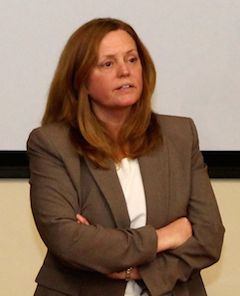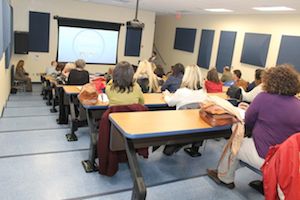Frustration was the word of the evening at Thursday’s parent forum on Common Core standards held at Riverhead High School.
Some 25 to 30 concerned parents turned out for a presentation by Riverhead Schools Superintendent Nancy Carney and Assistant Superintendent David Wicks on what the Common Core is — and is not — all about. The two administrators were joined by every building principal and other administrators for the presentation, which was followed by a Q&A with parents.
 “There is a lot of misinformation out there,” Carney told the group assembled in the just-remodeled large-group instruction classroom. People are confusing the Common Core standards with assessment tests and the new teacher evaluation requirements.
“There is a lot of misinformation out there,” Carney told the group assembled in the just-remodeled large-group instruction classroom. People are confusing the Common Core standards with assessment tests and the new teacher evaluation requirements.
“The world is changing,” Carney said. “Our kids are being challenged with things that we were not when we were in school. As educators it’s our responsibilty to make sure they are prepared for the world they will be living in.”
“Our struggle with the Common Core is not that we don’t believe the standards are good. As a parent, an educator and a global thinker, I can’t find anything in the Common Core that I don’t agree with,” the superintendent said.
Wicks, the assistant superintendent for curriculum, told parents “we have to face reality. All of our kids are not wehere they need to be. They’re not graduating college- and career-ready.”
To support that contention, Wicks displayed statistics from ACT, which publishes college entrance exams. According to the ACT stats, 51.7 percent of of college freshmen at two-year colleges and 19.9 percent of freshmen at four-year college sare in need of remedial education.
The college drop-out rate is “shocking,” Wicks said.
 Wicks walked the parents through curriculum shifts as a result of the Common Core standards and explained what they meant before Carney opened the floor for questions.
Wicks walked the parents through curriculum shifts as a result of the Common Core standards and explained what they meant before Carney opened the floor for questions.
Parents at the forum vented the most frustration with mathematics — and with the stress of what they called high-stakes testing. They complained about too much time spent on test-prep for assessments that they said seem designed for failure, and they complained about too much homework.
“Every single night, our home is a battleground over math,” aid Kerry O’Connell of Jamesport. “There’s no textbook, no online resources. There’s nowhere for me or my daughter to go to learn the steps for arriving at the correct answer.”
O’Connell said she’s upset that her daughter, who is in advanced math in 7th grade, saw her grades plummet this year. “Last year she was a math warrior. This year she’s getting 50s and saying, ‘I’m not good at math.’ Now she hates math. It’s keeping her off the honor roll.” she said.
“That’s something we have to work on internally,” Carney replied. “It has not been an easy implementation and it’s not unique to Riverhead. Kids are being given tests and have not been properly taught the material yet because the teachers haven’t had the opportunity to understand and embrace the material yet.”
Her response drew cries of “So why are we doing it?”
“It’s not an option for us to ignore what we’re being asked to do,” Carney answered.
“The unfortunate thing N.Y. state did was tie APPR [teacher evaluations] and implement the assessments before we were ready. That has been the challenge we’re faced with. “We’re trying to navigate our way to figuring out how to deal with it.”
Ed Powers of Jamesport, father of eight, said the Common Core is “making a divide between the haves and the have-nots.” He said he spends four hours a night helping his children, four of whom are still in school, with their homework. The most time-consuming is his fifth grader’s homework.
“It’s totally consumed my life,” Powers said.
“Kids should not have four hours of homework every night,” Carney responded. “At the elementary level they should have no more than a half hour, at the middle school level, an hour, and in high school no more than two hours. That’s it. And if it goes over that, as a parent, you have to stop it. Our teachers should not be sending things home that kids can’t do. They shouldnt have four hours of homework. That’s wrong.”
Yolanda Thompson of Aquebogue said one of the big problems with Common Core is that “the standards were worked backwards from 12th grade.”
“Instead of starting at the bottom and working our way up, we’re asking our 4th and 5th graders to do exactly what we’re asking our seniors to do. We’re asking children whose brains arent fully developed yet to do things theyre not capale of doing,” Thompson said, adding, “It’s not because of higher expectations.”
“The Common core standards blew up years and years of research,” another mother agreed.
“The standards don’t match those [child] developmental charts.”
Keri Stromski, a first grade teacher at Aquebogue Elementary School and the mother of three children in the district — one in kindergarten, one in second grade and one in fifth grade — said Riverhead schools have “always had really good standards.” The Common Core standards themselves are not the problem. The modules that were thrust upon teachers are the problem, she said. That’s the curriculum.
“A lot of it is not kid-friendly. When you bring in a new program the smart thing to do is start in kindergarten and first, then move to second and third and so on. We didn’t have that liberty. The state threw it in and covered all of us. I was kicking and screaming when I got these modules,” Wicklund said.
“The older kids are having a really hard time. They didn’t have the base. They’ve just been thrown right into it,” Wicklund said. “And with the budget cuts and 25 kids in a class and no TA, it’s very hard to spend the time with kids who are struggling.”
Carney said she believes its the assessment tests, not the Common Core standards, that are the problem. The assessments are not assessing what kids are learning, she said. “Our frustration has to do with the assessments, who’s creating the assessments, the language of the assessments,” she said. “They are not matched to the developmental level.” The superintendent said she thought the old assessments — pre-Common Core — were “just as bad.”
Assemblyman Anthony Palumbo, who joined the meeting in progress upon his return from Albany that evening asked to speak to the group, which Carney said concerned her. “This is a parent forum, not a political forum.”
Palumbo said he supports an optional three-year moratorium on the Common Core rollout, adopted by the State Senate, which was voted down in the Assembly.
“Even if it passes both houses, the governor is going to veto it, so Common Core is probably here to stay,” Palumbo said.
“I disagree with you on Common Core,” Carney told the assemblyman. “The thing that is frustrating to me as an educator is that politics is getting involved in what we’re doing in education and that’s what’s bothering me,” she said. “I don’t want the politicians making this a political game about trying to get constituents to vote for them because they’re passionate about something — and no offense — that they don’t necessarily know or have as much information about, because they’re not educators.”
The superintendent said after the meeting she was not surprised by the level of frustration expressed by parents, particularly with math and homework. She is hopeful, she said, that “as students and teachers become more familiar with new vocabulary and expectations, the frustration will lessen.”
“In the mean time, we need to be sure that time spent on homework is developmentally appropriate,” Carney said. “I have observed many good lessons that are aligned to the Common Core. I am confident that as we move forward, we will find the right balance of providing our students with the skills and knowledge that they need to be successful in the 21st century. This balance includes a curriculum and program that fosters creativity through the arts, project-based learning, and real-world problem solving.”
Correction: A previously published version of this story incorrectly stated Keri Stromski’s name and name of the school where she teaches.
The survival of local journalism depends on your support.
We are a small family-owned operation. You rely on us to stay informed, and we depend on you to make our work possible. Just a few dollars can help us continue to bring this important service to our community.
Support RiverheadLOCAL today.































